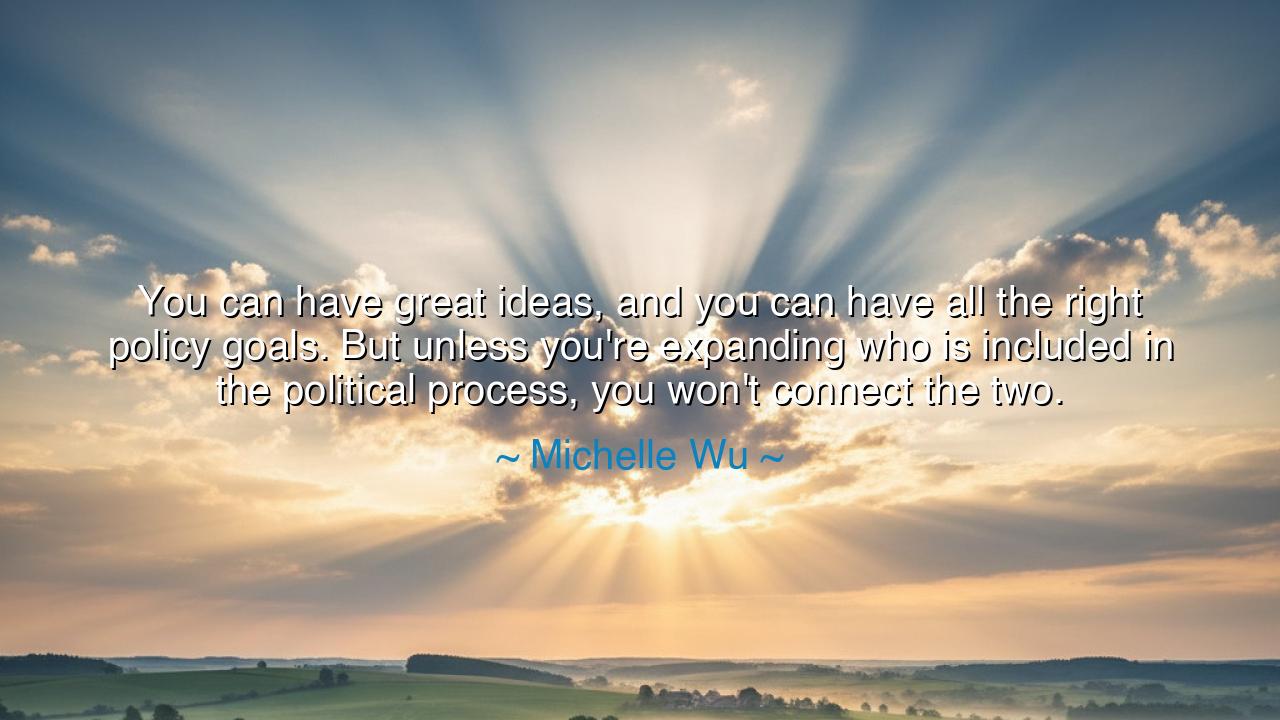
You can have great ideas, and you can have all the right policy
You can have great ideas, and you can have all the right policy goals. But unless you're expanding who is included in the political process, you won't connect the two.






“You can have great ideas, and you can have all the right policy goals. But unless you're expanding who is included in the political process, you won't connect the two.” Thus spoke Michelle Wu, a leader of our own age who understands that the strength of a society is not measured by the brilliance of its thinkers alone, but by the breadth of its participation, the depth of its inclusion, and the courage of its unity. Her words are not only political in their wisdom — they are moral, spiritual, and profoundly human. For what she teaches is this: that no idea, however noble, can take root in the soil of the world unless the people themselves are invited to plant and tend it.
In the ancient days, the same truth was known to the founders of democracy in Athens. They, too, learned through struggle that the city could not flourish when power belonged only to a few. It was not enough for philosophers to dream of justice or for lawmakers to craft decrees — the people themselves had to be part of the design. For without the participation of the many, the wisdom of the few becomes arrogance, and the dream of progress withers. Michelle Wu’s words carry that same eternal echo: ideas without people are hollow, but people without inclusion are silent. True governance is the art of uniting the two — the vision of the mind and the voice of the community.
Her insight was born not from theory, but from experience. As the Mayor of Boston, Michelle Wu rose from humble beginnings, the daughter of immigrants, carrying within her the lived truth of those often left unseen in the corridors of power. She witnessed how policy, when crafted without the input of the people it affects, can become detached — how good intentions can falter when they fail to speak in the language of the lived experience. Thus, she declared that every idea, no matter how brilliant, must be rooted in inclusion — in the active effort to draw in those who have been historically excluded from the political process: the poor, the marginalized, the unheard. Only when they are brought into the conversation does governance become not an abstraction, but a living force of justice.
History, too, bears witness to this truth. In the long march of humanity, great revolutions have failed when they forgot to expand inclusion. The French Revolution began with ideals of liberty, equality, and fraternity — yet, when it failed to give voice to all, when it devoured its own sons and silenced its daughters, it collapsed into tyranny. But contrast this with the civil rights movements of the twentieth century, when leaders like Martin Luther King Jr. and Fannie Lou Hamer widened the circle of democracy, insisting that freedom must be shared or it is no freedom at all. Their victories were not only moral but practical, for they understood what Wu reminds us: policy and people must meet, or both will perish.
The ancients would have called this the balance of the polis — the harmony between wisdom and participation, between leadership and the collective heart. In the Republics and kingdoms of old, when rulers turned away from their people, they fell into decay. But when they listened — truly listened — their societies became strong and enduring. The law of unity is unbreakable: a government is not a body of laws alone, but a covenant of souls. Thus, the ruler who wishes to lead must first learn to include; the thinker who dreams must first learn to listen.
Wu’s words also speak to the soul of every individual, for each of us governs something — a household, a workplace, a community, or even the quiet territory of our own conscience. The principle of inclusion she speaks of must begin there. When we listen to others, when we open space for voices unlike our own, our ideas grow stronger, our vision clearer, our hearts wiser. The great error of humanity has always been the belief that progress comes from domination; but the truth is that progress comes from collaboration. The tree grows not by crushing the roots beneath it, but by drawing nourishment from them.
So let this be your lesson, O seeker of wisdom and justice: ideas alone do not change the world — people do. Policies alone cannot heal a nation — participation can. Therefore, whatever your calling, seek to expand the circle. Invite others in. Listen to the quiet ones, uplift the forgotten, and remember that the measure of greatness lies not in how high one stands, but in how many one raises with them.
For as Michelle Wu teaches, the true bond between vision and victory is not power, but inclusion. When every hand is welcome, when every voice finds its echo in the halls of decision, then the ideas of the wise and the needs of the people will meet — and together, they will create something eternal: a society not only of order, but of connection, justice, and hope.






AAdministratorAdministrator
Welcome, honored guests. Please leave a comment, we will respond soon